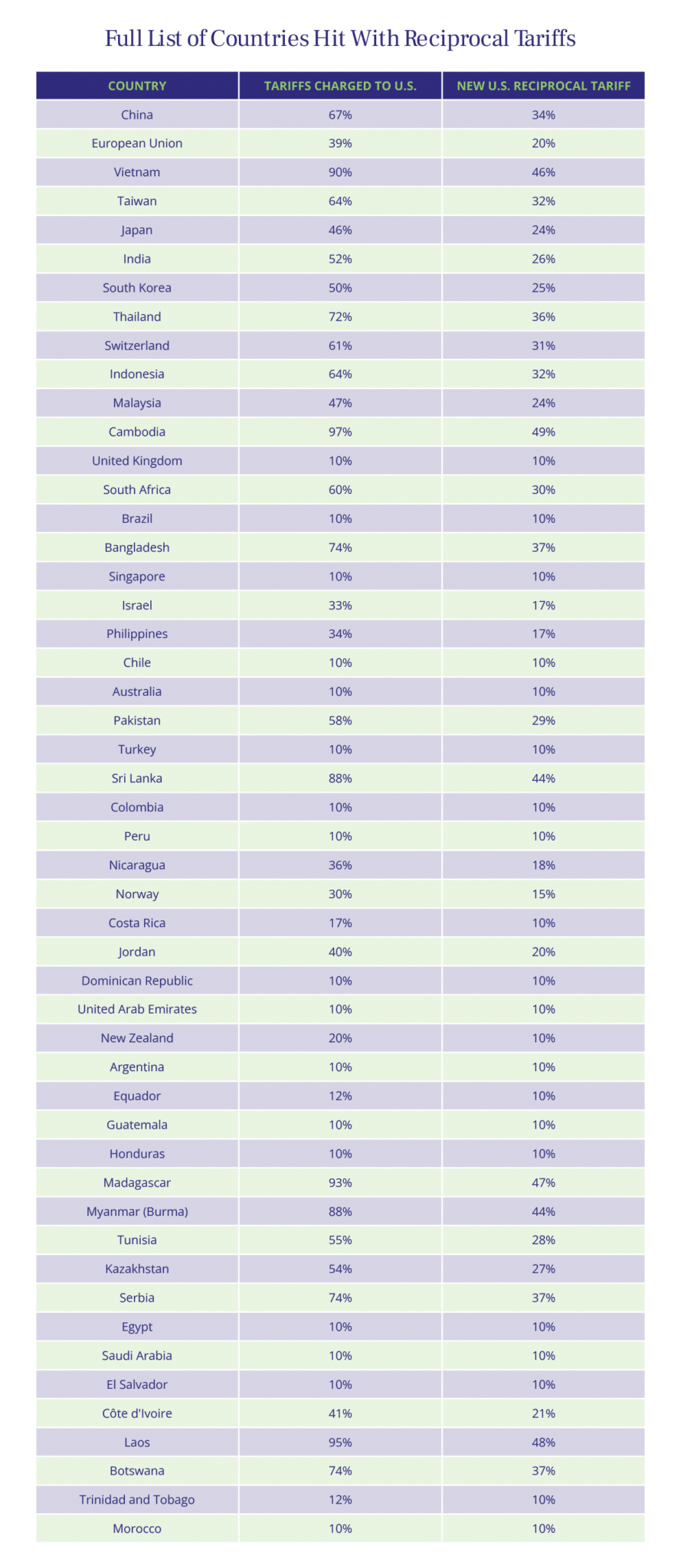President Donald Trump signed an executive order on Wednesday enacting global reciprocal tariffs, claiming, “it’s our declaration of economic independence.”
The announcement represents a significant shift in U.S. trade policy and could have wide-ranging implications across markets, supply chains and sectors critical to the promotional products industry.
- Trump will impose a 10% tariff on all imports into the U.S., effective April 5.
- Higher tariffs will be charged against roughly 60 countries that levy higher rates on the U.S., effective April 9.
“We will charge them approximately half of what they are and have been charging us,” Trump said in a press conference from the White House Rose Garden. “So, the tariffs will be not a full reciprocal.”
- Canada and Mexico will be exempt from the baseline 10% tariff rate as well as reciprocal tariffs for specific countries for now, according to the Trump administration. The 10% tariff would only kick in for them if and when the original 25% tariffs Trump slapped on Canadian and Mexican imports are terminated or suspended.
- At midnight Wednesday night, 25% tariffs on imported cars and key auto parts go into effect.

According to the White House, the president is invoking his authority under the International Emergency Economic Powers Act of 1977 to address the “national emergency posed by the large and persistent trade deficit that is driven by the absence of reciprocity in our trade relationships and other harmful policies like currency manipulation and exorbitant value-added taxes perpetuated by other countries.”
Trump is basing the reciprocal tariff rates on how much other countries tax U.S. exports, “including currency manipulation and trade barriers,” NBC News reported. The White House told reporters those numbers were calculated by the Council of Economic Advisors, headed by Stephen Miran.
- Trump also signed an executive order closing the de minimis loophole that allows duty-free shipments of Chinese goods worth less than $800.
Many U.S. businesses have largely abandoned the idea that full protection from the broad-based duties can be achieved, especially laid on top of the sector- and country-specific levies the president has ordered during his first months in office, according to reporting by Dylan Moroses of Law360.
PPAI’s Stance
Tariffs are one of the issues that PPAI members and staff will be discussing with members of Congress during PPAI’s Legislative Education and Action Day in Washington, D.C., next week.
- Items sourced into the U.S. will likely experience price increases, with some of the additional costs expected to be assumed by suppliers and distributors, and more being passed along to end buyers.
“We’ll share the impacts our industry has seen so far and ask legislators to remember that most promo firms are small businesses and consider how these policies will affect American workers, entrepreneurs and consumers,” says Rachel Zoch, public affairs and research editor for PPAI.
PPAI has long supported free trade. Serving members of all political stripes, the Association recognizes the need for policies that strengthen the U.S. economy and support domestic manufacturing. However, any measures – including tariffs – must be implemented strategically to minimize short-term economic disruption while setting the stage for long-term growth.

Drew Holmgreen
President/CEO, PPAI
Abrupt cost increases impact businesses of all sizes, from small distributors to global suppliers, ultimately affecting jobs, investment and product pricing throughout our industry.
“We advocate for a thoughtful approach – one that balances economic goals with the realities of supply chain dynamics,” says Drew Holmgreen, president and CEO of PPAI. “With support from our lobbying partners in Washington, we are in ongoing conversations with industry volunteers, trade groups and policymakers with the goal to ensure that any trade policies consider the full scope of their impact and allow businesses time to adapt.”
How Will The World Respond?
Nations impacted by the reciprocal tariffs have been considering various measures ahead of the announcement, according to reporting by Kevin Pinner of Law360.
- China, Canada and Mexico, who were already in Trump’s tariff crosshairs, have already retaliated, with more actions likely to come.
Southeast Asia countries like Thailand and Vietnam are looking at reducing tariffs, with the latter proposing to cut tariff rates across the board for countries with “most favored nation” status, which applies to all countries in the World Trade Organization, including the U.S.
Japan has considered removing non-tariff barriers to U.S. automobile imports, buying more liquified natural gas from the U.S. and even renegotiating the U.S.-Japan Trade Agreement signed during Trump’s first administration, according to the Hudson Institute think tank.
RELATED: ‘A Partner As Committed As We Are:’ 2 Suppliers Divided By Only The Border
India is also working toward concessions. On March 25, lawmakers in India’s lower house of Parliament voted to abolish the country’s digital services tax, which the United States Trade Representative previously found discriminates against U.S. companies.
- This comes on the heels of Trump and Indian Prime Minister Narendra Modi agreeing to negotiate a new trade deal by the fall.
South Korea has established a special unit – U.S. Countermeasures Headquarters – within the Korea Customs Service specifically to handle the reciprocal tariffs.
Australia doesn’t plan on imposing retaliatory tariffs against the U.S., Jenny Gordon, a former economist in the Australian government and current nonresident fellow at the Lowy Institute, told Law360.
The European Union has vowed to place retaliatory tariffs on the U.S. worth $28 billion. Meanwhile, UK Prime Minister Keir Starmer says the UK “rules nothing out” and is “prepared for all eventualities.”
Tariffs Are Determined By Country Of Origin
A tariff applies to an import based on the country that the goods were made in or originated from. The reason for the tariff is typically to have some sort of negative impact on that country of origin in trade wars or negotiations.
- At a time when the U.S. is applying tariffs to a potentially unprecedented number of countries, it’s important that distributors have conversations with their supplier partners to achieve clarity and avoid assumptions.
- For example, in the case of Montreal-based Spector & Co., PPAI 100’s No. 25 supplier, a significant amount of the products is sourced from China, which is a different tariff conversation than the one involving Canadian tariffs.
- There is “a very small subsection” of Spector products manufactured in Canada, and there is also a small duty placed on Canadian labor that the company is able to absorb.
“There’s no difference between dealing with us versus dealing with anyone in the U.S.,” says Marla Ruttenberg, Spector’s chief financial officer, as a message to distributors needing to bring product to the U.S.

Marla Ruttenberg
CFO, Spector & Co.
To clarify further, Spector is still paying tariffs on their Chinese imports before bringing them into the U.S. With so much of promo (and most industries) reliant on China, this is an issue faced by many U.S. suppliers as well. There is no second set of tariffs applied to Spector for getting the products over the U.S. border.
“It’s going into the U.S. as duty paid,” says Ruttenberg. “We’re paying the duty when they come in, not when they go out.”
- This is also the case with imports for companies based in Mexico or any other country. It is a crucial point of understanding that a company being based in a certain country does not guarantee that its products are also manufactured in that country, as most U.S. suppliers will tell you.
This has been a point of emphasis also made by PPAI Board Chair Denise Taschereau, CEO and co-founder of Vancouver-based distributor Fairware, who warns against knee-jerk reactions, particularly, members abandoning companies that operate in Mexico and Canada.

Denise Taschereau
PPAI Board Chair
“It’s critical to understand the impacts,” Taschereau says. “Traditionally, tariffs are anchored in country of origin, so your partners in Mexico or Canada who are decorating goods from overseas shouldn’t be impacted. We want to continue to support those brands and uplift them at a time like this.”
For questions or suggestions on regulatory or government affairs issues, please contact Rachel Zoch at RachelZ@ppai.org.


